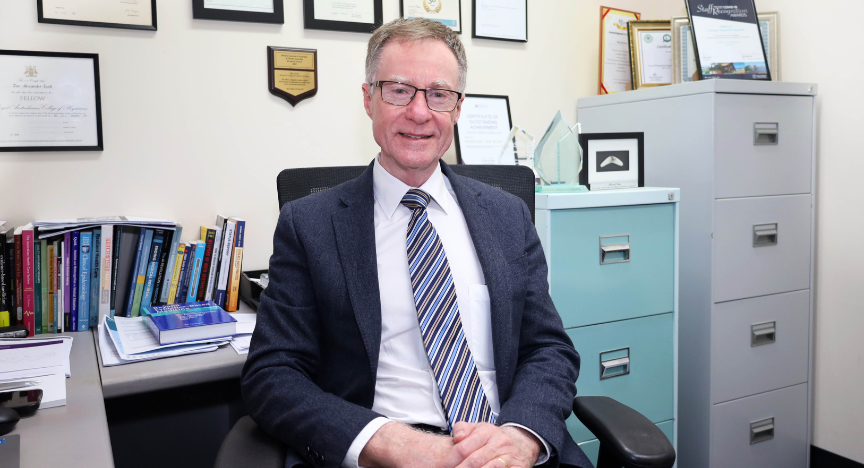
Professor Ian Scott
Longstanding consultant general physician Professor Ian Scott has made remarkable contributions to his field since taking on the role of inaugural Director of Internal Medicine at the PA Hospital in 1996.
He was tasked with building the unit from the ground up, and after nearly 30 years, is now preparing to bid farewell to a role that’s changed significantly since its inception.
“When I arrived, there was really no dedicated department of general medicine, so the establishment of the department involved the challenge of defining general medicine units and establishing roles and rosters,” said Prof Scott.
“Originally, the department was assigned around 60 to 70 beds, but that has grown to 120 beds in 2024 and we average 110 to 120 admissions a week. We now have six consultants with up to 10 advanced trainee registrars rotating through the year.
“One of my proudest achievements during my time at PA is helping establish the Medical Assessment and Planning Unit (MAPU) which opened in 2011. We published the first systematic review on MAPUs back in 2009 and wrote the first Australian-wide guidelines for these units.
“Within about a year of the MAPU opening we had shown a reduction of about 1.5 days in the average length of stay for all our general medicine patients. On an annual basis, this worked out as a saving of about 28 beds.”
Prof Scott’s tireless efforts to expand the role and capacity of general medicine are clear.
Another big project to improve care of patients hospitalised with acute coronary syndromes and congestive heart failure was commenced in 1999 including general medicine and cardiology units at PA, RBWH, QEII, and three Divisions of General Practice. The resulting protocols, guidelines, and models of care showed improved inpatient and post-discharge care processes and patient outcomes.
“The success of that project then led to the establishment of a state-wide cardiac care improvement collaborative which recruited 15 hospitals throughout the state. Again, we published studies that showed improved care. We also established a cardiac rehabilitation collaborative at the same time, which revealed under-utilisation of this intervention, prompting the health department to fund more cardiac rehabilitation and cardiac failure services. These results leave a legacy of patient benefit which I’m proud of.”
Prof Scott’s many other achievements at PAH have included establishing a perioperative medicine service, a medical stabilisation service for patients with eating disorders and a rapid access service for general medical patients at high risk of re-presentation. He has also led local, statewide and national initiatives in improving patient flow, minimising low value care, deprescribing inappropriate polypharmacy, promoting advance care planning, reducing diagnostic error and advancing digital health.
But Prof Scott says the successes at PAH and beyond would not have been possible without the incredible team surrounding him.
“Our nursing staff really deserve the most credit because they care for and manage patients with high care needs 24/7. They are part of a great multidisciplinary team that includes our general physicians and junior medical staff, allied health professionals, liaison psychiatrists and geriatrician colleagues. I’m proud that our team effort has been able to sustain a high level of performance despite increasing workloads and patient complexity.”
Prof Scott will step down from his PAH Director role at the end of June, but he’s not going far.
“I’m taking up a part time appointment with Digital Health and Informatics here at Metro South so I can continue working on various projects involving the use of artificial intelligence (AI), with the help of the MS Clinical AI Working Group that I chair.
I also chair the Queensland Sepsis AI Working Group which is developing an AI-enabled tool aimed at early recognition and treatment of sepsis, the most common cause of unexpected in-hospital death. I will also have an appointment with the UQ Digital Health Centre working on AI-related projects, so I’m not retiring to the sofa just yet.”
But he is looking forward to having more time on his hands to enjoy the things he loves, including spending time with family, travelling, and hiking.
“It’ll also be nice to indulge in a bit of recreational reading of books that are non-medical.”
While this chapter of Prof Scott’s career is coming to a close, there are no doubts he leaves a legacy of dedication and expertise within the walls of the PA Hospital and beyond.